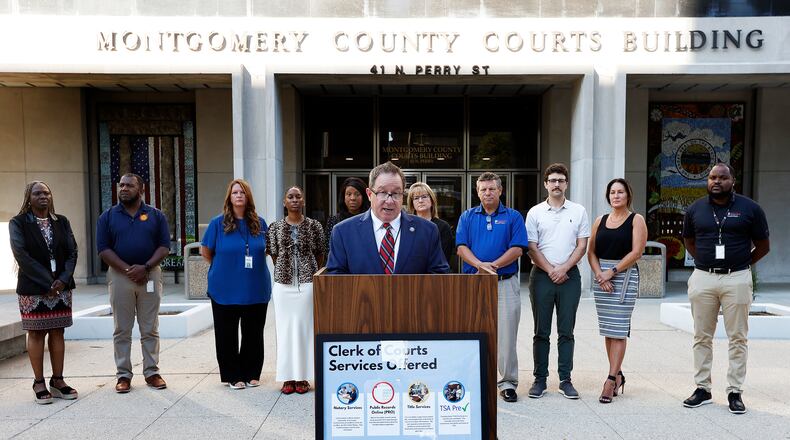The documents were created by state auditor’s office investigators in August ahead of suspension proceedings before a three-judge panel that decided last month against suspending Foley from office while he awaits trial.
Records reference interviews that built the state’s case against Foley — this includes interviews with dozens of his past and current employees.
Foley has maintained his innocence and pleaded not guilty to 12 counts: attempted unlawful interest in a public contract, three counts of complicity to commit unlawful interest in a public contract, two counts of theft in office, one count of unauthorized use of computer, cable or telecommunication property, and misdemeanor counts of solicitation of political contributions from public employees and prohibition against partisan political activity.
Foley has called the investigation of his office a “sham,” “one-sided” and “politically motivated.”
“I’m letting it play out,” Foley told the Dayton Daily News in a written statement. “I feel confident that once all the facts are presented, that I will be vindicated of all charges and look forward to continuing the great work in the Clerk of Courts office.”
Political contributions
Records show that out of the 77 former or current clerk of courts employees interviewed by the state auditor’s special investigations unit, 18 told investigators that they were verbally asked at work to either financially contribute or work on Foley’s campaign. Several of these employees were union workers, according to the state.
Employees allegedly told investigators that solicitations were made by Foley himself, his former campaign treasurer and employee Elle Sollenberger, or other management.
“Some employees stated they felt coerced to contribute to their boss’ campaign,” investigator Diane Bouza wrote in the affidavit submitted in the state’s response to Foley’s proposed suspension.
Other employees pointed to a work email sent during the 2020 election indicating Foley campaign signs would be delivered to their private residences unless they indicated they were not interested in receiving signage.
“Employees reactions ranged from offended, coerced, uncomfortable, to scared,” Bouza wrote. “Some employees felt there would be repercussions if they said no to Foley.”
In a written response to Dayton Daily News, Foley said fundraising is a “necessary evil” when serving in a public office and that his employees volunteer to help with his campaign regularly — whether it be through canvassing or donations.
“They do freely, without pressure offer their support, and I’m very appreciative of that,” he said. “We are like family. It means a great deal to me to have their support.”
Campaigning and county time
The special investigations unit raided Foley’s office in 2022. A forensic analysis was conducted of Foley’s and Sollenberger’s computers, according to records.
The analysis of Foley’s computer found 200 examples over a five-year period of emails related to personal use. This includes messages about campaign activity, work outside of the office and even Foley’s wedding plans. Foley previously said this is not out of line with policy around county email use.
State investigators say they found emails and documents related to Foley’s campaign, fundraising events, solicitations and campaign finance records on Sollenberger’s computer, as well as emails about Sollenberger’s personal businesses.
Sollenberger was the former treasurer of Foley’s campaign, a responsibility she acquired after being “voluntold” to do it, the affidavit says. It says she told state investigators that Foley promised her a position at the clerk’s office that earned $60,000 annually for working as his campaign manager, but she was hired in a different position at a lower rate.
Sollenberger alleged that Foley asked her to make campaign solicitations from clerk of courts staff. She said Foley also knew she was using the printers at the clerk’s office to create campaign materials, and he “expected” her to finish this work in the office, according to records.
“Sollenberger stated that she performed all work related to Michael Foley’s campaign, political contribution solicitations and work on his private business on county time and that this was a significant part of her work at the Clerk of Courts’ Office,” Bouza wrote.
Foley said that like some of his other employees, Sollenberger was allowed to do some work from home. He alleged that she went “rogue” during that time and worked on tasks outside of her county job without his permission.
Sollenberger declined to comment to the Dayton Daily News about the investigation or her testimony.
Other counts
The state’s response to Foley’s proposed suspension, as well as the bill of particulars filed in the Montgomery County Common Pleas Court for Foley’s case, detail other counts against the clerk.
A charge of unlawful interest in a public contract is included in Foley’s indictment for his alleged interactions with two financial advisors and Montgomery County Treasurer John McManus, where Foley “purposely and knowingly made efforts to have (McManus) move County funds to a private investment firm with which (Foley) was associated,” according to the bill of particulars.
Foley’s attorneys have argued that Foley is not an associate of the two financial advisors and would not have benefitted financially from any contract they would have made with the county.
Judge Piergies, who was indicted with Foley this summer, is tied to Foley’s other charges of unlawful interest in a public contract and aiding and abetting unlawful interest in a public contract, according to records.
The state alleges that Piergies transferred funds from the municipal court to the clerk’s office for his son’s employment in information technology at the clerk’s office.
Foley’s attorneys have argued that courts aside from the municipal court in Montgomery County have transferred money to the clerk’s office for information technology work as a part of a shared costs model, and money transferred from the municipal court did not fund Piergies’ son’s position.
About the Author

